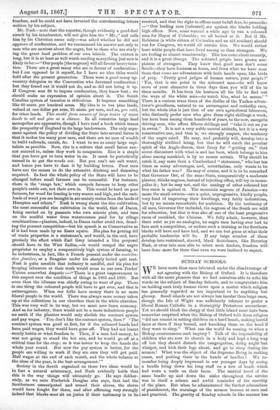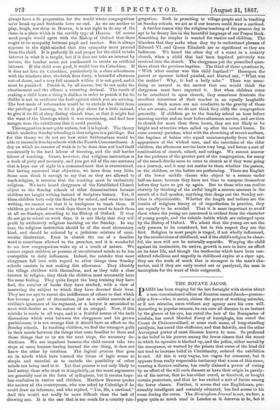SUNDAY SCHOOLS.
WE have more than once laboured under the disadvantage of not agreeing with the Bishop of Oxford. It is therefore with all the more pleasure that we find ourselves able to echo his words on the subject of Sunday Schools, and to congratulate him on holding such truly human views upon a matter which religion has generally regarded as too important to be anything but gloomy. Small islands are not always less insular than large ones, though the Isle of Wight was sufficiently tolerant to prefer a liberal Roman Catholic to a thoroughly Protestant accoucheur. Yet we should think the clergy of that little island must have been somewhat surprised when the Bishop of Oxford told them religion "did not consist in setting children on a hard bench, making horrid faces at them if they buzzed, and knocking them on the head if they went to sleep." What can the world be coming to when a Bishop countenances such impiety ? Talk of the impossibility of children who are sent to church in a body and kept a long way off lest they should disturb the congregation, doing aught but whisper, and kick their legs about, and go to sleep • during the sermon! What was the object of the Supreme Being in making canes, and putting them in the hands of beadles ? We re- member being deeply impressed in our younger days by seeing a beadle bring down his long staff on a row of heads which had worn a smile on their faces. The martial tread of the same beadle up and down the aisles throughout the service was in itself a solemn and awful reminder of the sanctity of the place. But when he administered the further admonition of punishment, the warnings of the sermon became at once real and practical. The gravity of Sunday schools in like manner has
always been a fit preparation for the world where congregations neer break up and Sabbaths have no end. As we are neither to play, laugh, nor sleep in Heaven, it is not right to do any of the three in a place which is the earthly type of Heaven. Of course most people would agree with the Bishop of Oxford that there ought to be sympathy between pupil and teacher. But it always appears to the right-minded that this sympathy must proceed from the child. It is perfectly fit and proper for the child to take interest in what it is taught, but if it does not take an interest by nature, the teacher must not condescend to create an artificial interest. If the child were good, it would love its Catechism. If it does not love its Catechism, particularly in a close schoolroom with the windows shut, the brick floor dusty, a beautiful afternoon out-of-doors, and a very full stomach within, it is not good, and it must be punished. Punish it, by all means, but do not make the chastisement and the offence a recurring decimal. The result of making a child learn a thing it dislikes in order to punish it for its dislike is not to eradicate the fault against which you are striving. The beat mode of reformation would be to exclude the child from the privilege of learning, to let it play about for a little instead, to give it its fill of sleep during church time, so that it might feel the want of the blessings which it was reuouucing, and find how meagre were the substitutes that it could provide.
This suggestion is not quite serious, but it is logical. The theory which underlies Sunday schooling is that religion is a privilege. But for this theory we do not see how strict Sabbatarians would be able to reconcile Sunday schools with the Fourth Commandment. A day on which no manner of work is to be done does not lend itself consistently to the hard labour of learning, and the still harder labour of teaching. Grant, however, that religious instruction is a work of piety and necessity, and you get rid of the one sentence that is kept out of sight in a commandment that is overstrained. But having answered that objection, we have done very little. Some men think it enough to say that as they are allowed to teach religion, it remains that the teaching must be exclusively religious. We have heard clergymen of the Established Church object to the Sunday schools of other denominations because children are taught writing instead of Scripture history. Yet, if these children have only the Sunday for school, and want to learn writing, we cannot see that it is irreligious to teach them. If children go to school on week days there is no need to teach them at all on Sundays, according to the Bishop of Oxford. If they do not go to school on week days, it is not likely that they will profit by exclusively religious teaching on the Sunday. In any case, the religions instruction should be of the most elementary kind, and should be relieved by a judicious mixture of semi- secular illustration. Even in church the use of a familiar word is sometimes allowed to the preacher, and it is wonderful to see how congregations wake up at a touch of nature. We cannot expect children or persons of uncultivated minds to be less susceptible to daily influences. Indeed, the mistake that most clergymen fall into with regard to other things than Sunday schools consists in not making this allowance. They identify the village children with themselves, and as they take a close interest in religion, they think the children must necessarily have the same feeling. They quite forget the long training they have had, the number of books they have studied, with a view of mastering the subject to which they have devoted their lives. They are too apt to resent the indifference of others to that which has become a part of themselves, just as a soldier marvels at a civilian's ignorance of his regiment, or a lawyer is astonished to meet with doubts as to the nature of an estoppel. Now, if this mistake is made in all ways, and is a fruitful source of the tacit dissensions which exist between the clergyman and his grown parishioners, it is not strange that it should have an effect on the Sunday schools. In teaching children, we find the strangest gulfs in their minds between the things that seem familiar to them and those things that to us are the next steps, the necessary de- ductions. We are impatient because the child cannot take two steps at once, because having learned the one thing, it does not know the other by intuition. The logical process that goes on in minds which have learned the forms of logic seems so simple and essential as to exclude the possibility of other minds not being used to it. Yet that process is not only likely to lead astray those who trust to it implicitly, as the worst arguments are generally cast in the form of syllogisms, but it creates hope- less confusion in rustics and children. Matthew Browne quotes the answer of the countryman, who was asked by Coleridge if he could draw an inference, and who replied, " Yes, Sir, a cartload." And this would not really be more difficult than the task of drawing one. It is the one that is too much for a country con-
gregation. Both in preaching to village people and in teaching at Sunday schools, we act as if our hearers could draw a cartload.
A further reason why the religious teaching of the present day is apt to be dreary lies in the beautiful language of our Prayer Book. Something far simpler is wanted for rustics and children. The blunders that they make when they try to understand phrases of Edward VI. and Queen Elizabeth are as significant as they are ludicrous. We heard the other day of a scene in a country church, when a child that had been baptized privately was received into the church. The clergyman put the prescribed ques- tions about the previous baptism. The third of these questions is,. " With what matter was this child baptized ?" Hereupon the parent or sponsor looked puzzled, and blurted out, " What was the matter? Why, it had a belly ache." There was some- thing so natural in the answer that one would think the clergyman must have expected it. But when children come to be catechized in open church, they sometimes frustrate the excellent intentions of their teacher in an equally laughable manner. Such scenes are not conducive to the gravity of those who are awake, and we do not think they edify the congregation generally. If children go to the Sunday school an hour before morning service and an hour before afternoon service, and are then in church for more than three hours, they are not likely to be
bright and attentive when called up after the second lesson. In • country parishes, what with the churching of recent mothers,, the baptism of babies who squall uninterruptedly from the first appearance of the wicked man, and the catechism of: the elder- children, the afternoon service lasts very long, and forms a sort of combination of church, school, and cottage. We cannot answer for the patience of the greater part of the congregation, for many of the smock-frocks seem to come to church as if they were going on a journey, and it may not matter to them whether the parson, or the children, or the babies are performing. There are English of the lower middle classes who object to a sermon under- half-an-hour, because they have not time to compose themselves before they have to get up again. But to those who can realize eternity by thinking of the awful length a minute assumes in the- mouth of a dull speaker, anything that drags out the Sunday ser- vices is objectionable. Whether the length and tedium are the results of religious theory or of imperfection in practice, they are equally to be avoided. That it is most important to avoid them where the young are concerned is evident from the character of young people, and the volatile habits which are enlarged upon by the Bishop of Oxford. We admit that the young are not the only persons to be considered, but in this respect they are the- first. Religion in most people is tinged, if not wholly influenced, by the recollections of childhood, and if the child's religion be cheer- ful, the man will not be naturally soporific. Warping the child against its instinctive, its native, growth is sure to have an effect- on its later life, and though the tendencies which have been con- sidered rebellious and ungodly in childhood expire at a riper age, they are the seeds of much that is strongest in the man's cha- racter, and if they are early rooted out or paralyzed, the man is, incomplete for the want of their outgrowth.































 Previous page
Previous page